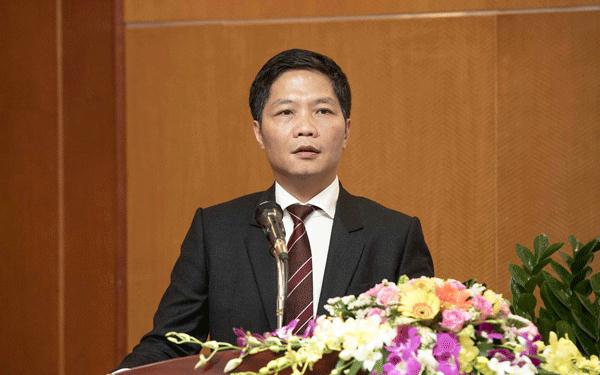Minister of Industry and Trade first to be questioned by NA
*Loss-making projects
Fielding the first question about loss-making projects using State capital and managed by the Ministry of Industry and Trade, the minister cited as example five prolonged projects which are the Thai Nguyen iron and steel plant, the Phuong Nam paper pulp mill, the Ninh Binh fertilizer factory, the bio-fuel plant at Dung Quat and the Dinh Vu fiber mill. He pointed out that those five projects all suffered from fluctuations in the world market, particularly the sharp drop in oil and crude oil prices from US$100-147 to US$40 per barrel.
Other reasons behind the inefficient operation of those projects are the limited capacity of investors, project management boards, negotiation teams and contractors.
 |
| Minister of Industry and Trade Tran Tuan Anh. |
He emphasized the goal of retaining State capital, asset and interests when dealing with those projects, adding that all solutions should be in accordance with market principles and international commitments.
“We can consider selling those projects and even declare bankruptcy if necessary,” the minister said, noting that his ministry has submitted to the Government recommended solutions and the Government will meet after the NA session to decide on specific measures.
*Overlapping State management of fertilizer market
The issue of fake, poor-quality fertilizer was raised by many deputies during the hearing. Minister Tran Tuan Anh said overlapping State management of the fertiliser market has hindered efforts to restore order. At present, the Ministry of Trade and Industry control the production and trade of inorganic fertilizers, while organic fertilizers are under the management of the Ministry of Agriculture and Rural Development.
Another problem is the permission of too many types of fertilizer on the market, with more than 5,000 kinds of organic and 5,700 kinds of inorganic fertilizers.
The Ministry of Industry and Trade and the Ministry of Agriculture and Rural Development have held many working sessions to address those problems. Most recently, the two ministries have proposed that the Government assign one ministry to manage fertilizer products and market, and relevant ministries and agencies coordinate to reduce the number of types of fertilizers allowed in the market, Minister Tran Tuan Anh said, citing the example of Thailand which allows the production and sale of just more than 100 types of fertilizers.
The Ministry of Industry and Trade is working on a set of 16 standards for fertilizer, which may be transferred to the Ministry of Science and Technology for approval early next year, according to the minister.
Explaining the issue further, Minister of Agriculture and Rural Development Nguyen Xuan Cuong pointed to two other major problems, one of which is the orientation in the use of fertilizer. Vietnam consumes 10-11 million tonnes of fertilizer each year, but up to 90 percent of which are chemical fertilizers.
The minister said this is a major factor affecting the quality of farm produce while causing pollution and soil degradation. “It is the responsibility of the agricultural sector to promote the use of organic fertilizer, thus gradually shifting to clean agricultural production, which is in line with the Party and State’s policy on restructuring agriculture,” he said.
* Ensuring safety when discharging water from hydropower plant reservoirs
Many deputies requested that the Minister of Industry and Trade report on the handling of violations of rules in water discharge at hydropower plant reservoirs.
Minister Tran Tuan Anh said his ministry has compiled a 20-page report on the planning of hydropower plants and reviewing their licensing and operation.
“We do not develop hydropower at any cost, and this is the guiding viewpoint of the Party, State and Government,” he said, affirming that the ministry has reviewed and considered the elimination of projects that can affect the environment and local people’s life.
The minister said there are 336 hydropower projects, with the Ministry of Industry and Trade being the main State management agency of them, while the Ministries of Construction, Natural Resources and Environment, and Agriculture and Rural Development also exercise management of those projects in several aspects.
In the time ahead, the Ministry of Industry and Trade will assess water discharge procedures at hydropower plants and review flood and storm response work in localities where there are such plants.
The ministry will assign clear responsibilities of all concerned parties, such as local authorities, dam owners, plant investors in the water discharge process, along with sanctions for any violations.

